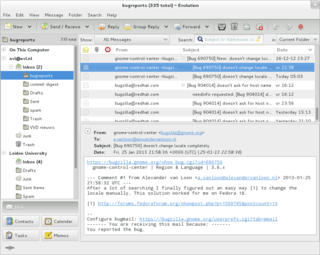
Electronic mail is a method of transmitting and receiving messages using electronic devices. It was conceived in the late–20th century as the digital version of, or counterpart to, mail. Email is a ubiquitous and very widely used communication medium; in current use, an email address is often treated as a basic and necessary part of many processes in business, commerce, government, education, entertainment, and other spheres of daily life in most countries.

Spamming is the use of messaging systems to send multiple unsolicited messages (spam) to large numbers of recipients for the purpose of commercial advertising, for the purpose of non-commercial proselytizing, for any prohibited purpose, or simply repeatedly sending the same message to the same user. While the most widely recognized form of spam is email spam, the term is applied to similar abuses in other media: instant messaging spam, Usenet newsgroup spam, Web search engine spam, spam in blogs, wiki spam, online classified ads spam, mobile phone messaging spam, Internet forum spam, junk fax transmissions, social spam, spam mobile apps, television advertising and file sharing spam. It is named after Spam, a luncheon meat, by way of a Monty Python sketch about a restaurant that has Spam in almost every dish in which Vikings annoyingly sing "Spam" repeatedly.
news.admin.net-abuse.email is a Usenet newsgroup devoted to discussion of the abuse of email systems, specifically through email spam and similar attacks. According to a timeline compiled by Keith Lynch, news.admin.net-abuse.email was the first widely available electronic forum for discussing spam.
Information privacy is the relationship between the collection and dissemination of data, technology, the public expectation of privacy, contextual information norms, and the legal and political issues surrounding them. It is also known as data privacy or data protection.
Various anti-spam techniques are used to prevent email spam.

The Controlling the Assault of Non-Solicited Pornography And Marketing (CAN-SPAM) Act of 2003 is a law passed in 2003 establishing the United States' first national standards for the sending of commercial e-mail. The law requires the Federal Trade Commission (FTC) to enforce its provisions. Introduced by Republican Conrad Burns, the act passed both the House and Senate during the 108th United States Congress and was signed into law by President George W. Bush in December 2003.

Mobile phone spam is a form of spam, directed at the text messaging or other communications services of mobile phones or smartphones. As the popularity of mobile phones surged in the early 2000s, frequent users of text messaging began to see an increase in the number of unsolicited commercial advertisements being sent to their telephones through text messaging. This can be particularly annoying for the recipient because, unlike in email, some recipients may be charged a fee for every message received, including spam. Mobile phone spam is generally less pervasive than email spam, where in 2010 around 90% of email is spam. The amount of mobile spam varies widely from region to region. In North America, mobile spam steadily increased after 2008 and accounted for half of all mobile phone traffic by 2019. In parts of Asia up to 30% of messages were spam in 2012.

Email spam, also referred to as junk email, spam mail, or simply spam, is unsolicited messages sent in bulk by email (spamming). The name comes from a Monty Python sketch in which the name of the canned pork product Spam is ubiquitous, unavoidable, and repetitive. Email spam has steadily grown since the early 1990s, and by 2014 was estimated to account for around 90% of total email traffic.

The Spamhaus Project is an international organisation based in the Principality of Andorra, founded in 1998 by Steve Linford to track email spammers and spam-related activity. The name spamhaus, a pseudo-German expression, was coined by Linford to refer to an internet service provider, or other firm, which spams or knowingly provides service to spammers.
Email harvesting or scraping is the process of obtaining lists of email addresses using various methods. Typically these are then used for bulk email or spam.

Bulletproof hosting (BPH) is technical infrastructure service provided by an Internet hosting service that is resilient to complaints of illicit activities, which serves criminal actors as a basic building block for streamlining various cyberattacks. BPH providers allow online gambling, illegal pornography, botnet command and control servers, spam, copyrighted materials, hate speech and misinformation, despite takedown court orders and law enforcement subpoenas, allowing such material in their acceptable use policies.
The Data & Marketing Association, also known as the DMA, is a trade organization for marketers. In 2017 their web site stated "Yes, 100 years ago we were the Direct Mail Marketing Association and then the Direct Marketing Association. Now we embrace …"
The history of email spam reaches back to the mid-1990s when commercial use of the internet first became possible - and marketers and publicists began to test what was possible.
In online advertising, contact scraping is the practice of obtaining access to a customer's e-mail account in order to retrieve contact information that is then used for marketing purposes.

The Network Advertising Initiative is an industry trade group founded in 2000 that develops self-regulatory standards for online advertising. Advertising networks created the organization in response to concerns from the Federal Trade Commission and consumer groups that online advertising — particularly targeted or behavioral advertising — harmed user privacy. The NAI seeks to provide self-regulatory guidelines for participating networks and opt-out technologies for consumers in order to maintain the value of online advertising while protecting consumer privacy. Membership in the NAI has fluctuated greatly over time, and both the organization and its self-regulatory system have been criticized for being ineffective in promoting privacy.[Missing Citation]
Visitors to Israel must obtain a visa from one of the Israeli diplomatic missions unless they come from one of the visa exempt countries. All visitors must hold a passport that is valid for 6 months after the date of departure from Israel.
The Fighting Internet and Wireless Spam Act, is Canada's anti-spam legislation that received Royal Assent on December 15, 2010. The Act replaced Bill C-27, the Electronic Commerce Protection Act (ECPA), which was passed by the House of Commons, but died due to the prorogation of the second session of the 40th Canadian Parliament on December 30, 2009. The Act went into effect July 1, 2014.

The General Data Protection Regulation is a European Union regulation on information privacy in the European Union (EU) and the European Economic Area (EEA). The GDPR is an important component of EU privacy law and human rights law, in particular Article 8(1) of the Charter of Fundamental Rights of the European Union. It also governs the transfer of personal data outside the EU and EEA. The GDPR's goals are to enhance individuals' control and rights over their personal information and to simplify the regulations for international business. It supersedes the Data Protection Directive 95/46/EC and, among other things, simplifies the terminology.
A cold email is an unsolicited e-mail that is sent to a receiver without prior contact. It could also be defined as the email equivalent of cold calling. Cold emailing is a subset of email marketing and differs from transactional and warm emailing.
Unsolicited advertisement comprise all of, but are not limited to:







